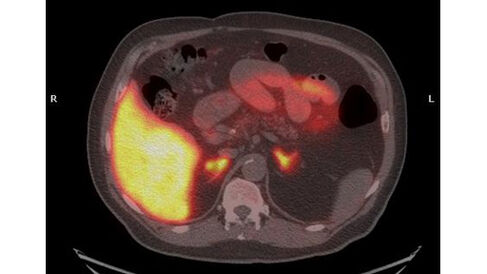Industry Expert-in-Residence helps researcher secure £1.5m grant for PET scanning research

High blood pressure, or hypertension, rarely has noticeable symptoms. But if untreated, it increases risk of serious problems such as heart attack and stroke. Up to 10% of hypertension patients suffer from primary hyperaldosteronism (PHA), a treatable form of hypertension. An accurate imaging method of the adrenal gland is essential to direct appropriate treatment of PHA but current methods, based on CT scanning or Magnetic Resonance Imaging (MRI) lack sensitivity, can be highly invasive and fail in as many as half of all cases.
Professor Franklin Aigbirhio works in the Wolfson Brain Imaging Centre. His group investigates the development and application of molecular imaging probes, in particular for the in vivo imaging technique Positron Emission Tomography (PET). PET scanning is widely used for imaging tumours and for clinical diagnosis of certain brain diseases such as those causing various types of dementia. The technique depends on detection of gamma rays emitted by a radionuclide tracer, which is introduced to the body on a biologically active molecule. Designing probes that will target the precise area of the brain or other organ that the clinician wishes to image is challenging.
Aigbirhio's reserach objectives are to design, develop and apply imaging probes that are specific and selective to biological markers and are sensitive to biochemical changes associated with disease mechanisms. In 2016, in collaboration with other researchers at Cambridge and Uppsala University Sweden, he decided to apply for a grant from the MRC’s Biomedical Catalyst: Developmental Pathway Funding Scheme (DPFS) to develop and trial a particular molecular probe for PET imaging of the adrenal gland. The aim is to improve diagnosis and inform treatment of PHA, thus addressing a significant unmet need.
Dr John Pritchard is an expert in medical diagnostics and devices and acts as an Industry Expert-in-Residence for the University, providing advice to academics on clinical translation and commercialisation of their research and industrial collaborations. He provided key advice to Aigbirhio helping to structure the commercialisation strategy for the project which was invaluable to securing the funding.
“We submitted a strong scientific proposal for obtaining funding from the MRC” said Aigbirhio. “However, we had several questions from the MRC funding panel throughout the application process regarding our IP and commercialisation strategy. John Pritchard’s advice was central in responding to these questions and putting in place a strategy that help convince the panel to award funding. Going forward, the team at Cambridge Enterprise is helping us in implementing this commercialisation and IP strategy and engaging with a commercial partner.”
Aigbirhio and his collaborators were awarded £1.5M to take this research forward.
Image: PET-CT scan of adrenal glands using the radiopharmaceutical [11C]Metomidate. (Courtesy of Franklin Aigbirhio, Morris Brown Mark Gurnell)
